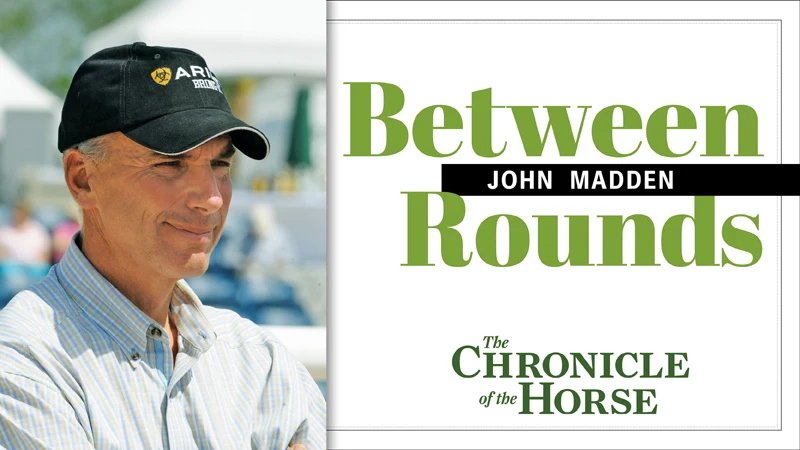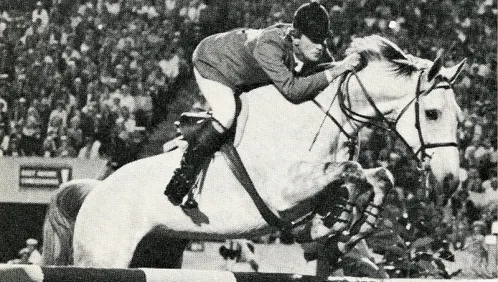The author believes that success in these competitions is integral to the entire U.S. horse industry.
At the time of writing, the United States has just earned second place in the Meydan FEI Nations Cup series, also known as the Super League.
Each of these eight shows ranks among the best in part because they have maintained their character. Each is a bit different, each a reflection of their national identity, and each truly excellent.
France was the series winner; they deserved it. We were second, and we deserved it. Many top riders, owners, coaches, federations and wonderful horses from the 10 competing countries were involved in this series. The amount of time, energy, blood, sweat and tears spent, spilled and cried is almost unimaginable.
I was witness to much of the series, as between Cara Raether and Beezie Madden, I was coach of at least one rider in every top league show this year. I missed La Baule but was present at all seven others.
The details of each Nations Cup have been written, the scores are all in and FEI TV covered each on their website. This commentary is not a news report. I hope you will be interested in what Nations Cups mean to me, why they are here, why they are important—and what they mean to you and the sport.
A Cascade Effect
Nations Cups are rooted in the very foundation of our sport. The first international team competition was held in 1909 at the Olympia Show in London. At that time, it was a competition amongst military officers. France prevailed, as they did 101 years later in the 2010 top-level series.
This brings me to a main point of this column—not who finished on top—but which of the 10 countries would be relegated. This year the number of teams in the Super League is being dropped to eight—therefore two teams have to go. But in the meantime teams from the promotional league have been qualifying all year to move up. The net effect is four teams move down, two teams move up.
My Dutch friends were in the unhappy position of needing an excellent performance in Dublin in order to dodge relegation, and they won there and stayed in. Let’s look for a moment at why it was so important to avoid relegation.
Once relegated, the riders of that country would not be allowed to compete at eight of the best shows in the world. They would need to field a team at the promotional league, which means asking riders and owners to go to shows in obscure places, with very low prize money and at times substandard conditions. Fielding teams for this series is not easy with the pressures of the Global Champions Tour and other good prize money competitions closer to home.
The cascade effect, though, is nearly endless. No Super League, no chance to compete at the biggest shows, no chance for good prize money. Riders get lower level experience and can’t practice at the top, and owners can’t have horses go to the best shows, so they choose to sell.
At lower-level competitions, there are fewer classes to count for the FEI Rolex world jumping rankings, therefore riders drop on the world list and hence receive fewer invitations to big five-star shows. The invitations to World Cup qualifying shows are given based on the number of riders on the world list, so fewer riders get a chance to go to the qualifiers and therefore less at the final.
ADVERTISEMENT
If anyone questions the importance of the Super League, one only needs to note the reaction of the Dutch when faced with relegation. It was a national effort to stay in. The economy of the Dutch horse business relied on remaining in.
Improvement Through Diversity
Much has changed through the years, but the fundamentals have remained the same. It’s a team competition. This year we witnessed excellent teamwork and unity, guided by George Morris.
Riders, owners and trainers functioned well under the strain. We had some good and some bad, some sick or hurt horses, requiring adjustments to be made. All involved did the right thing and put the team first, which is not always easy to do. In a Nations Cup situation owners and riders must put the needs of the team first. We are not used to this; it can be a foreign concept to some in our individual sport.
Beezie expected to be the fifth rider (four compete, and the fifth is a traveling spare) at La Baule, Rome and St. Gallen on Mademoiselle, and she also expected to be a solid contributor, if not a hero, at Rotterdam and Aachen, riding Danny Boy. In fact what happened was quite different. Beezie ended up riding Mademoiselle in the Nations Cup at Rome and St. Gallen and not riding in the Cup at either Rotterdam or Aachen due to the sickness of Abigail Wexner’s lovely 10-year-old, Danny Boy.
Danny is A-OK now, but not having him available thrust Candice King out of the fifth rider role with Davos and right into the fire. Candice was ready, willing and able, getting great Nations Cup scores of 0/0 at Rotterdam and 0/4 at Aachen. Beezie was moved to be fifth rider at those shows but was revved and ready to go if needed, with either Mademoiselle at Rotterdam or Via Volo at Aachen.
Thankfully, Beezie wasn’t needed, and our team won Rotterdam and was third in Aachen with Beezie helping in the warm-up of every horse, consulting on strategy and, along with George, Lizzy Chesson (USEF Director of Show Jump-ing High Performance Programs) and all of the individual mini-teams (owners, trainers and grooms), doing everything possible for the success of the U.S. team.
Why do we do it? Why is it important?
Pride of country is huge. I hope every person from every country feels the pride I do for mine. Diversity is fascinating, wonderful and valuable. We need pride in our countries in order to maintain this diversity.
Competition in anything with diverse approaches to the challenge fosters excellence. Even slight differences in perspective mean that we each take the test slightly differently. The keen observer learns from this, and the whole sport is elevated.
Every country in the world has learned from us over the years, as we have from them, with a net effect of improvements in every aspect of our sport. This affects every horse and every enthusiast in the world. The constant testing at an extremely high level and the differing systems of each country yields improvements in riding, training, breeding, veterinary care, shoeing and horse show organization.
The Bigger Picture
The corollary of this is that we have an individual sport most of the time. The teamwork of the Nations Cup fosters within our own team the sharing of knowledge, experience and wisdom. It’s a great tool to develop riders in our own country.
ADVERTISEMENT
This teamwork also helps develop our mini-teams (stables). The common effort fosters sharing that normally would not happen. It creates dialogue. The Super League is a great time and place to work on the “sport” of the sport. The pressure of team competition can be a real wake-up call that forces objective self evaluation.
The Nations Cup also fosters national pride and interest amongst the media and therefore the public. Media coverage causes public interest, public interest brings sponsors, sponsors bring money, money at the top brings research, which grows the feeder system for horses and riders.
As the sport grows, so does the opportunity. I believe more money at the top makes the sport more, not less, affordable for the grassroots. More horses bred mean more horses for everyone, more horse jobs, more and better shows and more chances for lower income riders and owners to buy young and sell up. This has already been proven in Europe where the sport is bigger than in the United States.
Additionally, our country’s success in Nations Cups inspires riders at all levels. Everyone who has ever sold a horse or pony or trained a beginner, adult amateur or grand prix rider benefits from our success and is hurt by our failure in many ways. How, you ask? In a number of ways, our performance in Nations Cups is one of many things that control funding of our federation by the U.S. Olympic Committee.
Our performance in Nations Cups determines whether our country is allowed to compete at the FEI World Equestrian Games and the Olympic Games. Try selling a horse to or giving a lesson to a little girl who has been told she cannot have an Olympic dream because our nation is not good enough to get her there. Maybe she will never make it to the Olympics or the WEG, but much of the value of our sport lies in the dream of it, the pursuit of the ideals.
Consider the breeders of our country. Most breed with the goal of producing horses that represent the ideals of their breed, each hoping that the next generation of foals will outshine their sires and dams and will be successful at the top of their sport. Without the potential opportunity for these horses to make it to the top at Nations Cups, WEGs and Olympics and to showcase their full capabilities, what happens to our breeders? Choices of sires and dams based on upper level performances are limited, and the following generations of American-bred horses risk a loss in quality.
The Nations Cup allows us to represent our country. It is an honor I am proud to be a small part of. I am proud of all of the positive effects it has on our sport and all that goes with that.
The part of the Nations Cup I love the most, though, is that it’s bigger than the individual: the spirit of teamwork, the camaraderie forged through adversity, the challenge of earning something no one can buy and the pride and honor of service and duty to one’s country and the horse.
Meydan FEI Nations Cup Series
- La Baule (France)
- Rome (Italy)
- St. Gallen (Switzerland)
- Rotterdam (the Netherlands)
- Falsterbo (Sweden)
- Aachen (Germany)
- Hickstead (England)
Dublin (Ireland)
John Madden, Cazenovia, N.Y., is married to international grand prix rider Beezie Madden. Together, they operate John Madden Sales Inc., where they train horses and riders. The horse business has encompassed John’s entire life, and in addition to his business he’s the Organizing Committee Chairman for the Syracuse Sporthorse Tournament (N.Y.) and on the USEF High Performance Show Jumping Computer List Task Force. He began contributing to Between Rounds in 2008.















